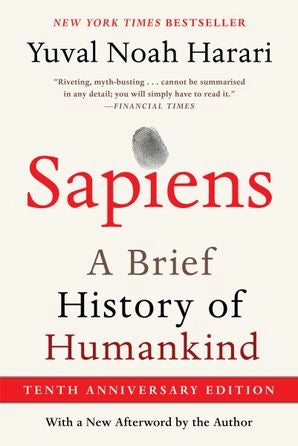Sapiens: A Brief History of Humankind
Sapiens: A Brief History of Humankind
by Yuval Noah Harari
Couldn't load pickup availability
Share


About the Book
Official U.S. edition with full color illustrations throughout.
New York Times Bestseller
A Summer Reading Pick for President Barack Obama, Bill Gates, and Mark Zuckerberg
From a renowned historian comes a groundbreaking narrative of humanity's creation and evolution--a #1 international bestseller--that explores the ways in which biology and history have defined us and enhanced our understanding of what it means to be "human."
One hundred thousand years ago, at least six different species of humans inhabited Earth. Yet today there is only one--homo sapiens. What happened to the others? And what may happen to us?
Most books about the history of humanity pursue either a historical or a biological approach, but Dr. Yuval Noah Harari breaks the mold with this highly original book that begins about 70,000 years ago with the appearance of modern cognition. From examining the role evolving humans have played in the global ecosystem to charting the rise of empires, Sapiens integrates history and science to reconsider accepted narratives, connect past developments with contemporary concerns, and examine specific events within the context of larger ideas.
Dr. Harari also compels us to look ahead, because over the last few decades humans have begun to bend laws of natural selection that have governed life for the past four billion years. We are acquiring the ability to design not only the world around us, but also ourselves. Where is this leading us, and what do we want to become?
Featuring 27 photographs, 6 maps, and 25 illustrations/diagrams, this provocative and insightful work is sure to spark debate and is essential reading for aficionados of Jared Diamond, James Gleick, Matt Ridley, Robert Wright, and Sharon Moalem.
About the Author
Prof. Yuval Noah Harari is a historian, philosopher, and the bestselling author of Sapiens: A Brief History of Humankind, Homo Deus: A Brief History of Tomorrow, 21 Lessons for the 21st Century, and Sapiens: A Graphic History Volume 1 and Volume 2. His books have sold over 35 million copies in 65 languages, and he is considered one of the world’s most influential public intellectuals today. The Guardian has credited Sapiens with revolutionizing the non-fiction market and popularizing “brainy books”.
Born in Haifa, Israel, in 1976, Harari received his PhD from the University of Oxford in 2002, and is currently a lecturer at the Department of History, the Hebrew University of Jerusalem. He originally specialized in world history, medieval history and military history, and his current research focuses on macro-historical questions such as: What is the relationship between history and biology? What is the essential difference between Homo sapiens and other animals? Is there justice in history? Does history have a direction? Did people become happier as history unfolded? What ethical questions do science and technology raise in the 21st century?
Editorial Reviews
“Sapiens tackles the biggest questions of history and of the modern world, and it is written in unforgettably vivid language.” — Jared Diamond, Pulitzer Prize-winning author of Guns, Germs, and Steel, Collapse, and The World until Yesterday
“Sapiens is learned, thought-provoking and crisply written…. Fascinating.” — Wall Street Journal
“In Sapiens, Harari delves deep into our history as a species to help us understand who we are and what made us this way. An engrossing read.” — Dan Ariely, New York Times Bestselling author of Predictably Irrational, The Upside of Irrationality, and The Honest Truth About Dishonesty
“Yuval Noah Harari’s celebrated Sapiens does for human evolution what Stephen Hawking’s A Brief History of Time did for physics.… He does a superb job of outlining our slow emergence and eventual domination of the planet.” — Forbes
“Ambitious and illuminating …the wonderful and terrifying saga of the human species on earth.” — Christian Science Monitor
“[I]nteresting and provocative…It gives you a sense of perspective on how briefly we’ve been on this earth, how short things like agriculture and science have been around, and why it makes sense for us to not take them for granted.” — President Barack Obama

